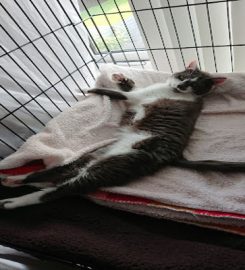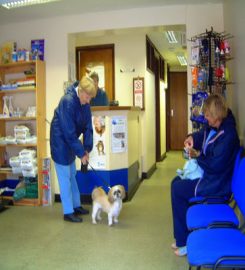
Cromwell Vets in Ramsey
Welcome to Cromwell Vets
Whether you’re an old friend or a new client, at Cromwell Vets we’re always here for you – right across Cambridgeshire, All day – everyday. We aim to make the best treatment and advice available for everyone, with six modern practices across our region.
At each practice you’ll find friendly and caring staff, high quality service, and access to local emergency out-of-hours treatment.
We look forward to welcoming you to Cromwell Vets.
Microchipping Your Pet
Microchipping is a permanent ID system, which involves a chip, no bigger than a grain of rice being implanted under the skin of your pet’s scruff.
Each microchip has a unique number, which can be read by a portable scanner, which most vets, including all Cromwell Vets branches, local authorities and rescue homes have access too; ensuring your contact details can be easily obtained from the central microchipping database. Once your pet has been scanned and identified by their microchip, a simple phone call can reunite you with your pet.
Microchipping is not only for dogs, but also for cats, ferrets, rabbits, snakes, parrot, tortoises and horses and comes highly recommended by all the team at Cromwell Vets. It is now also a legal requirement for all dogs to be microchipped, and all puppies must be vaccinated by 8 weeks of age before ownership is transferred from the breeder. You can be fined up to £500.00 if your dog is not microchipped. It is also worth noting, that if you are planning on taking your pet abroad, they must be microchipped and have a pet passport.
Sedation is not necessary for the implantation of the microchip as this procedure causes minimal discomfort and can be done in a routine consultation. And don’t worry if you can’t recall (or know) if your pet is microchipped – It is very easy to check for a microchip using a scanner. We can arrange for a member of the team at one of our Cromwell Vets branches to scan your pet and check for a working chip. Rest assured, we all always check that an animal hasn’t already got a microchip before implanting a new one.
Microchopping at Cromwell Vets
At the time of implant, you will be asked to complete a registration form, from which your details are then submitted to a national database by a Cromwell Vets team member. Your details are kept on the database for your pet’s lifetime, and the fee for this is included in the cost of implantation.
It is important to update any changes to your contact details as soon as possible. At Cromwell Vets, all our microchips comply with the International Standard (ISO) and can, therefore, be recognised by scanners abroad when used in the Pet Passport scheme.
Vaccinations at Cromwell Vets
Here at Cromwell Vets we believe that vaccinations are an important part of protecting your pets from severely harmful, yet preventable diseases and are an essential part of responsible pet care. Dogs, cats and rabbits are susceptible to a number of life-threatening diseases, but scientific advances and the introduction of immunisation has been very effective in reducing the number of cases dramatically.
It is tempting to assume that they are no longer a threat to our pets as we hear little about them, but they still do remain a constant danger, meaning the correct vaccination programme is the best way to keep your pet safe.
How do vaccines work?
Vaccines contain harmless (either weakened or dead) variants of the viruses and other infectious agents. When an animal is vaccinated the immune system in the body responds by generating a protective mechanism through the formation of antibodies. If the animal then becomes exposed to the actual disease at a later date, those antibodies will prevent the disease from developing.
The type of vaccines Cromwell Vets recommend will be based on your pet’s lifestyle, risk factors and current guidance. Modern vaccines give protection to multiple diseases with just one or two injections. It is important to remember though that vaccines don’t give lifelong immunity and that is why regular booster vaccinations are recommended.




